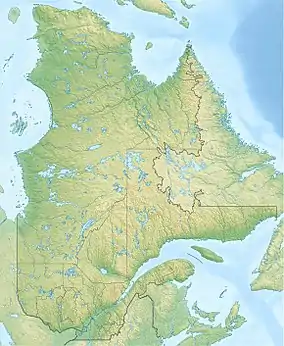| Bras à Pierre | |
|---|---|
 | |
| Etymology | a |
| Location | |
| Country | Canada |
| Province | Quebec |
| Region | Saguenay-Lac-Saint-Jean |
| Regional County Municipality | Le Fjord-du-Saguenay Regional County Municipality |
| Municipalities | Ferland-et-Boilleau and Rivière-Éternité |
| Physical characteristics | |
| Source | Streams in marsh area |
| • location | L'Anse-Saint-Jean |
| • coordinates | 48°06′36″N 70°26′03″W / 48.11009°N 70.43423°W |
| • elevation | 368 m (1,207 ft) |
| Mouth | Rivière Saint-Jean |
• location | L'Anse-Saint-Jean |
• coordinates | 48°09′36″N 70°24′39″W / 48.16°N 70.410845°W |
• elevation | 174 m (571 ft) |
| Length | 9.0 km (5.6 mi)[1] |
| Discharge | |
| • location | L'Anse-Saint-Jean |
The Bras à Pierre is a tributary of the Saint-Jean river, flowing in the municipality of L'Anse-Saint-Jean, in the Le Fjord-du-Saguenay Regional County Municipality, in the administrative region of Saguenay–Lac-Saint-Jean, in the province from Quebec, to Canada.
The valley of "Bras à Pierre" (English: Pierre's arm) is served by the Périgny road for forestry, agriculture and recreational tourism activities. Some secondary forest roads serve this valley.
Forestry is the main economic activity in the sector; recreational tourism activities, second; agriculture in third. This valley contains some dwellings distributed in small deforested areas.
The surface of "Bras à Pierre" is usually frozen from the beginning of December to the end of March, however the safe circulation on the ice is generally done from mid-December to mid-March.
Geography
The main watersheds neighboring the "Bras à Pierre" are:
- north side: Saint-Jean River, Emmuraillé Lake, Éternité River, Saguenay River;
- east side: Patrice-Fortin stream, Portage River, Petit Saguenay River, ruisseau de la sucrerie (sugar mill stream), Saint Lawrence River;
- south side: Bazile lake, Chouinard stream, Malbaie River, Noire River, "lac de la Hauteur" (Height lake);
- west side: Saint-Jean River, Rivière à la Catin, Brébeuf Lake, Cami River, Ha! Ha! River.[2]
The "Bras à Pierre" originates in the marsh area (length: 2.7 km (1.7 mi); maximum width: 0.4 km (0.25 mi))) between the mountains in the northern part of the Rivière à la Catin. This marsh area is fed by a few mountain streams. This source of the watercourse is located at:
- 1.0 km (0.62 mi) north of the course of the Rivière à la Catin;
- 1.9 km (1.2 mi) north of the hamlet "Le Bras-du-Suroît";
- 4.6 km (2.9 mi) west of a mountain peak reaching 858 m (2,815 ft);
- 4.7 km (2.9 mi) north-west of a mountain peak reaching 893 m (2,930 ft);
- 6.6 km (4.1 mi) south of the confluence of the "Bras à Pierre" and the Saint-Jean River.[2]
From the mouth of its source, the course of "Bras à Pierre" descends on 9.0 km (5.6 mi), according to a drop in level of 194 m (636 ft) according to the following segments:
- 3.0 km (1.9 mi) towards the north especially in the marsh area in a valley in a valley surrounded by high mountains, collecting the discharge (coming from the west) of a small lake, as well as the discharge (from the east) from another small lake, to a stream (from the east);
- 0.4 km (0.25 mi) westward, to a stream (coming from the west);
- 5.6 km (3.5 mi) towards the north in a valley between the mountains and forming a hook towards the west and a loop towards the east at the end of the segment, up to the mouth.[2]
Pierre's arm spills out onto the south bank of the Saint-Jean River. This mouth is located at:
- 3.9 km (2.4 mi) south-west of the hamlet "La Vallée-d'Amont";
- 10.1 km (6.3 mi) east of Brébeuf Lake;
- 10.8 km (6.7 mi) south-east of the village center of Rivière-Éternité;
- 16.3 km (10.1 mi) south of the confluence of the Éternité River and the Éternité Bay (Saguenay River);
- 18.2 km (11.3 mi) south-west of the confluence of the Saint-Jean River and Anse Saint-Jean (Saguenay River).[2]
From the confluence of "Bras à Pierre", the current:
- follows the course of the Saint-Jean River on 26.0 km (16.2 mi) generally towards the northeast;
- crosses Anse Saint-Jean on 2.9 km (1.8 mi) to the north;
- follows the course of the Saguenay River on 42.8 km (26.6 mi) eastward to Tadoussac where it merges with the Estuary of Saint Lawrence.
Toponymy
The term "Pierre" is a male given name.
The toponym "Bras à Pierre" was formalized on December 5, 1968, by the Commission de toponymie du Québec.[3]
See also
References
- ↑ "Bras à Pierre, Bank of Quebec place names". Commission de toponymie du Québec. Retrieved December 10, 2019.
- 1 2 3 4 "Atlas of Canada from the Department of Natural Resources Canada | Characteristics extracted from the geographic map, of the database and instrumentation of the site". 12 September 2016. Retrieved January 15, 2019.
- ↑ Commission de Toponymie du Québec - Bras à Pierre